|
|
|
Sort Order |
|
|
|
Items / Page
|
|
|
|
|
|
|
| Srl | Item |
| 1 |
ID:
087446
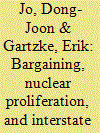

|
|
|
|
|
| Publication |
2009.
|
| Summary/Abstract |
Contrasting claims about the consequences of nuclear weapons rely on different interpretations about how leaders respond to risk, uncertainty, and the balance of power. Nuclear optimists use deterrence theory to argue that proliferation can promote stability and inhibit the use of force. Pessimists argue that proliferation precipitates nuclear hubris, accident, or anger that heightens the risk of war. It is also possible that nuclear weapons have no net effect on dispute propensity. Since states fashion their own bargains, nuclear status is bound to influence the distribution of influence. Proliferation also reflects existing tensions, biasing upward the apparent impact of nuclear weapons on conventional conflict. Instrumenting for the decision to proliferate, the authors find that nuclear weapons increase diplomatic status without much affecting whether states fight.
|
|
|
|
|
|
|
|
|
|
|
|
|
|
|
|
| 2 |
ID:
183163
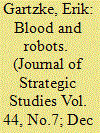

|
|
|
|
|
| Summary/Abstract |
New technologies such as Remotely Piloted Vehicles (RPVs) make it possible to remove human beings from direct involvement in combat. How will this evolving dynamic affect the practice and purposes of political violence? Will conflict become ‘costless’ in human terms as machines replace people on the front lines or will the logic of war continue to call for human sacrifice? While considerable attention has been devoted to the role of technology in transforming warfare, little is known about how new modes of combat will affect established motives for using force. I explore these political dimensions of new modes of conflict, drawing three basic conclusions. First, to the degree that substituting machines for humans lowers the costs for fighting, conflict will become more frequent, but less definitive. Second, in a reversal of previous trends, battlefield automation promises disproportionately to revitalise ground elements of military organisations. Finally, regrettably, new technologies should weaken inhibitions against targeting civilians.
|
|
|
|
|
|
|
|
|
|
|
|
|
|
|
|
| 3 |
ID:
145693
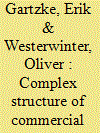

|
|
|
|
|
| Summary/Abstract |
Researchers continue to debate the impact of trade on interstate conflict. While many view trade as pacifying, others argue that dependencies increase friction and the risk of war. We provide a theory that explains how cross-border economic ties alternately enhance or impede international cooperation. Three main factors account for the heterogeneous effects of trade on conflict: interdependence, asymmetry, and multipolarity. Interdependence can act as a substitute for, or as a deterrent to, militarized violence. In the former case, interdependence actually increases more modest non-militarized conflict, while also discouraging militarized disputes. Asymmetry diminishes the conflict-inhibiting effect of trade ties, as dependency cannot simultaneously be used to coerce and to inform. Multilateral trade networks alternately moderate or enhance the bilateral effects of interdependence and asymmetry on interstate peace. Our theory and evidence reveal complex, cross-cutting consequences of economic interdependence on conflict behavior and also demonstrate effects well beyond the dyad, suggesting the need to include extradyadic ties in future theoretical and empirical research studying the commercial peace.
|
|
|
|
|
|
|
|
|
|
|
|
|
|
|
|
| 4 |
ID:
110813


|
|
|
|
|
| Publication |
2012.
|
| Summary/Abstract |
Growing interest in the social consequences of climate change has fueled speculation that global warming could lead to an increase in various forms of political violence. This article examines the effects of climate change on international conflict subsequent to the onset of European industrialization. Surprisingly, analysis at the system level suggests that global warming is associated with a reduction in interstate conflict. This naive relationship is suspect, however, as the increased consumption of carbon-based fuels is itself associated with changing patterns of politics and prosperity. In particular, economic development has been viewed as a cause of both climate change and interstate peace. Incorporating measures of development, democracy, cross-border trade, and international institutions reveals that systemic trends toward peace are actually best accounted for by the increase in average international income. The results imply that climate change, which poses a number of critical challenges for citizens and policymakers, need not be characterized as fundamentally a security issue, though climate change may have important security implications on the periphery of world politics. The analysis here also suggests that efforts to curb climate change should pay particular attention to encouraging clean development among middle-income states, as these countries are the most conflict prone. Ironically, stagnating economic development in middle-income states caused by efforts to combat climate change could actually realize fears of climate-induced warfare.
|
|
|
|
|
|
|
|
|
|
|
|
|
|
|
|
| 5 |
ID:
148044
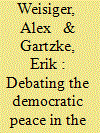

|
|
|
|
|
| Summary/Abstract |
In recent publications, we inquire whether the pacifying effects that are often attributed to democracy are likely to continue to hold as the world democratizes. Critics raise questions about the theoretical logic and especially the empirical results that we present. After clarifying our theoretical arguments, we discuss the central empirical critiques. We demonstrate that Crescenzi and Kadera’s (2016) finding of a pacifying effect of systemic democracy is driven not, as they claim, by the use of a better measure of systemic democracy, but by the unjustified decision to omit systemic regime difference from their analysis. Once we restore this variable, we find no evidence that democratization produces a system-level pacifying effect. We agree with our critics that the inclusion of dyadic regime difference produced misleading estimates for lower-threshold democracy. Because our arguments presume the historical existence of a dyadic democratic peace, however, this observation, if anything, resolves an apparent anomaly for our claims. Finally, we explain that Choi (2016) misunderstands the argument that systemic regime-type difference seeks to capture; we show that his proposed alternative neither captures our concept of interest nor accomplishes what he claims.
|
|
|
|
|
|
|
|
|
|
|
|
|
|
|
|
| 6 |
ID:
131240
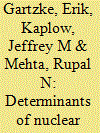

|
|
|
|
|
| Publication |
2014.
|
| Summary/Abstract |
A substantial literature examines the causes of nuclear proliferation, but few studies have addressed why states decide on a particular portfolio of weapon systems once they have acquired a basic nuclear capability. We advance a portfolio theory of nuclear force structure, positing that states seek a diverse set of capabilities for nuclear deterrence, but that they also face major resource and organizational constraints. A number of factors may help to explain the portfolio of nuclear forces that states ultimately field, including resource availability, experience as a nuclear power, bureaucratic politics, the conventional threat environment, the presence of nuclear rivals, and the maintenance of nuclear alliances. We test the influence of these factors on force structure using a new data set of nuclear weapon platforms fielded by nine nuclear nations between 1950 and 2000. Our findings represent an important step in understanding the drivers of nuclear behavior after states have joined the nuclear weapons club.
|
|
|
|
|
|
|
|
|
|
|
|
|
|
|
|
| 7 |
ID:
077072
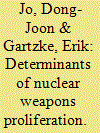

|
|
|
|
|
| Publication |
2007.
|
| Summary/Abstract |
Nuclear weapons proliferation is a topic of intense interest and concern among both academics and policy makers. Diverse opinions exist about the determinants of proliferation and the policy options to alter proliferation incentives. We evaluate a variety of explanations in two stages of nuclear proliferation, the presence of nuclear weapons production programs and the actual possession of nuclear weapons. We examine proliferation quantitatively, using data collected by the authors on national latent nuclear weapons production capability and several other variables, while controlling for the conditionality of nuclear weapons possession based on the presence of a nuclear weapons program. We find that security concerns and technological capabilities are important determinants of whether states form nuclear weapons programs, while security concerns, economic capabilities, and domestic politics help to explain the possession of nuclear weapons. Signatories to the Treaty on the Non-Proliferation of Nuclear Weapons (NPT) are less likely to initiate nuclear weapons programs, but the NPT has not deterred proliferation at the system level.
|
|
|
|
|
|
|
|
|
|
|
|
|
|
|
|
| 8 |
ID:
064658


|
|
|
| 9 |
ID:
186860
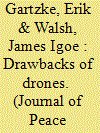

|
|
|
|
|
| Summary/Abstract |
Growing reliance on Unmanned Aerial Vehicles (UAVs) in the effort to combat militant groups has led to considerable debate about the consequences of this new mode of warfare. While critics have focused on the impact of civilian casualties on militant recruitment and the resulting use of terrorism, evidence suggests that ‘drones’ are paradoxically more effective in limiting civilian deaths compared to other forms of military force. This article demonstrates a different causal pathway connecting militant use of force to terrorist attacks. Drone strikes encourage militants to displace operations to urban centers. Confronted with unfamiliar terrain and greater government capacity, militants emphasize terrorist attacks against civilians. The article explores these dynamics in the longest running drone campaign, in Pakistan. While civilian casualties from drone strikes have no discernible effect on terrorism, strikes that kill militants increase terrorist attacks against civilians in urban settings, while failing to reduce attacks on government targets.
|
|
|
|
|
|
|
|
|
|
|
|
|
|
|
|
| 10 |
ID:
069082
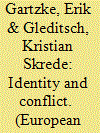

|
|
|
| 11 |
ID:
175510
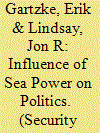

|
|
|
|
|
| Summary/Abstract |
Students of world politics have long shown a special interest in sea power. International relations, however, tends to treat the means of power as homogeneous and interchangeable. Are military capabilities largely undifferentiated goods, or do specific assets matter for politics? We argue that the characteristics of naval power offer distinctive tradeoffs in terms of the causes of war. Naval presence, firepower, and mobility enable naval nations to fight farther from home and obtain more diplomatic recognition. At the same time, mobility and stealth introduce ambiguity about national priorities and contribute to errors in assessing the local balance of power and resolve. We find empirically that disproportionate investment in sea power is associated not only with heightened diplomatic recognition and power projection across greater distances, as navalists expect, but also with increased instability in the form of a higher risk of dispute initiation. Disaggregating sea power by platform type—battleships, submarines, aircraft carriers—suggests similar tradeoffs across platforms as for navies generally. Sea power enables political leaders to intervene in distant locales, where their interests are more peripheral, and to reconsider their commitments, where their interests do not justify the risk. One counterintuitive implication is that offshore balancing strategies, which rely on sea power for deterrence, may actually be destabilizing.
|
|
|
|
|
|
|
|
|
|
|
|
|
|
|
|
| 12 |
ID:
106254


|
|
|
|
|
| Publication |
2011.
|
| Summary/Abstract |
In an article printed last year in International Organization, Keohane, Macedo, and Moravcsik argued that multilateral organizations (MLO) could actually be good for democracy. We argue that KMM discount the prospect that MLO influence can be detrimental to democracies not because MLOs are "distant, elitist, and technocratic" but precisely because MLOs are highly political. International organizations have much to offer in improving the welfare of citizens and facilitating coordinations among states. They are not likely to improve procedural functions of democracies without a cost that itself is problematic for democracy.
|
|
|
|
|
|
|
|
|
|
|
|
|
|
|
|
| 13 |
ID:
124373
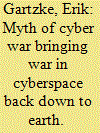

|
|
|
|
|
| Publication |
2013.
|
| Summary/Abstract |
A blitz of media, punditry, and official pronouncements raise the specter of war on the internet. Future conflicts may well take place in cyberspace, where victory or defeat could be determined in mere "nanoseconds."1 Secretary of Defense Leon Panetta has even warned of a "cyber-Pearl Harbor."2 Nor are fears of cyberwar abstract speculation. Events such as the denial of service attacks against Estonian and Georgian government websites, the Stuxnet worm designed to disable Iranian nuclear centrifuges, and the recent hacking of U.S. military computer networks seem to indicate that the era of cyberwar has already arrived.
|
|
|
|
|
|
|
|
|
|
|
|
|
|
|
|
| 14 |
ID:
131236
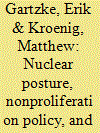

|
|
|
|
|
| Publication |
2014.
|
| Summary/Abstract |
What is the relationship between nuclear postures and nonproliferation policies and the spread of nuclear weapons? At first blush, this might appear to be an obvious question. After all, states go to great lengths-extending nuclear security guarantees to nonnuclear weapon states, forward-deploying nuclear weapons on the territory of allies, sizing their own nuclear arsenals with the proliferation decisions of other states in mind, supporting international institutions in conducting inspections of nuclear facilities in nonnuclear weapon states, restricting the availability of sensitive nuclear technology, applying and enforcing sanctions against would-be proliferators, conducting military strikes against nuclear facilities, and promoting nuclear cooperation for peaceful purposes, among many other steps-to prevent the spread of nuclear weapons. It would be strange to imagine that states pursue such actions unless they can expect a policy payoff in terms of peace or security. Yet, there is little systematic evidence to suggest that nuclear postures and policies have a meaningful impact on the spread of nuclear weapons.
|
|
|
|
|
|
|
|
|
|
|
|
|
|
|
|
| 15 |
ID:
119650


|
|
|
|
|
| Publication |
2013.
|
| Summary/Abstract |
Perhaps the simplest explanation for where fault lines lie in a political process involves the presence of an "other." Difference divides and similarity unites. These similarities and differences can in turn orient and propagate conflict. Yet, similarity and difference are also dynamic, evolving in response to changing population characteristics or a new reference point. We offer a simple explanation for interstate conflict in which the salience of similarity or difference varies with the prevalence or capabilities of groups. We apply our argument in the context of the democratic peace. When democracies are scarce or weak, and autocracies plentiful and powerful, democracies face a common threat. As the democratic community strengthens, however, the threat from autocracies declines and differences among democracies appear more salient. Our findings contrast with standard expectations about how democratization shapes world affairs.
|
|
|
|
|
|
|
|
|
|
|
|
|
|
|
|
| 16 |
ID:
186902


|
|
|
|
|
| Summary/Abstract |
The land, sea, air, space, and cyber domains have distinct operational characteristics. Specialization in the means of using or threatening force is not just a technical issue because choices to use different kinds of military instruments have political consequences. Conventional and nuclear capabilities in these domains have comparative advantages and disadvantages for three general types of strategy – coercion, warfighting, and deception. More complex strategies that cross or combine domains may achieve force-multiplying synergies or create significant trade-offs that affect military and political performance. This article describes the strategic constraints and opportunities posed by specialized force structures.
|
|
|
|
|
|
|
|
|
|
|
|
|
|
|
|
| 17 |
ID:
091453


|
|
|
|
|
| Publication |
2009.
|
| Summary/Abstract |
The world is changing. New relations and animosities are emerging as the fulcrum of global power migrates eastward. The new world order will reveal itself in time. Meanwhile, I am as uncertain as anyone else about the future structure of world politics.
|
|
|
|
|
|
|
|
|
|
|
|
|
|
|
|
| 18 |
ID:
155777


|
|
|
|
|
| Summary/Abstract |
Scholars interested in researching nuclear security are increasingly expressing the fear that the “important questions” have already been answered. At the same time, recent studies highlight the potential for major limitations on the ability to conduct casual inference on nuclear proliferation in particular, suggesting perhaps that we know much less than was previously believed. Although recognizing these challenges, this article argues that there remain ample opportunities to conduct innovative scholarship on questions of nuclear security. New nuclear challenges bring fresh opportunities for the next generation of research on topics including limited nuclear war; nuclear nonproliferation diplomacy; emerging technology, weapons proliferation and strategic stability; nuclear modernization and arms races; and many other issues. More precise theory, new data, and improved methods of inference also allow researchers to revisit and possibly resolve persistent debates. Although the problems confronting research on nuclear security are serious, they can be addressed. In sum, the questions in this field are so consequential that they deserve the best available analytical attention, even if the resulting answers are not perfect.
|
|
|
|
|
|
|
|
|
|
|
|
|
|
|
|
| 19 |
ID:
181164
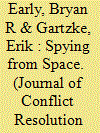

|
|
|
|
|
| Summary/Abstract |
Despite considerable interest and debate, it has proven surprisingly difficult to demonstrate a systematic link between technological change and patterns of war and peace. At least part of the challenge may reside in finding the right place to “look” for such relationships. Technological change alters what nations can do to one another (capabilities), but in ways that are typically reflected by deals (diplomatic bargains) rather than actions. We theorize that reconnaissance satellites have revolutionized the use of information gleaned from spying in ways that discourage states from engaging in serious conflicts with one another. We analyze the impact of reconnaissance satellites on high-casualty militarized interstate disputes (MIDS) between dyads from 1950 to 2010. We find that when either the potential aggressor or target in a dyad possess reconnaissance satellites, they are significantly less likely to become involved in serious MIDs. This effect is especially powerful when both states possess reconnaissance satellites.
|
|
|
|
|
|
|
|
|
|
|
|
|
|
|
|
| 20 |
ID:
116179
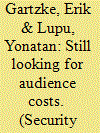

|
|
|
|
|
|
|
|